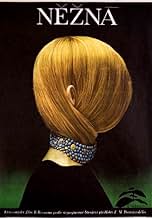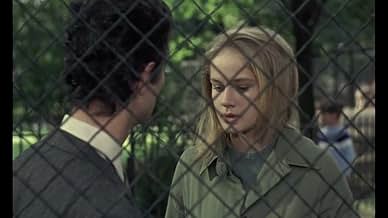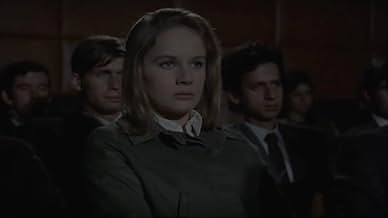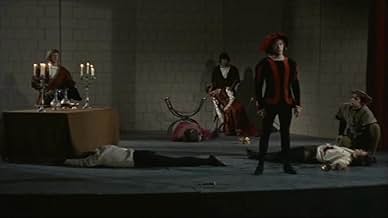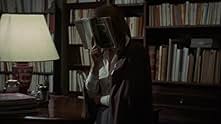IMDb-BEWERTUNG
7,3/10
3236
IHRE BEWERTUNG
Eine Frau bringt sich um und hinterlässt ihrem trauernden Ehemann keine Erklärung. Wir erfahren in Rückblenden, wie sie sich kennen gelernt und geheiratet haben und wie es ihr nicht gelungen... Alles lesenEine Frau bringt sich um und hinterlässt ihrem trauernden Ehemann keine Erklärung. Wir erfahren in Rückblenden, wie sie sich kennen gelernt und geheiratet haben und wie es ihr nicht gelungen ist, ihren Lebensstil an seinen anzupassen.Eine Frau bringt sich um und hinterlässt ihrem trauernden Ehemann keine Erklärung. Wir erfahren in Rückblenden, wie sie sich kennen gelernt und geheiratet haben und wie es ihr nicht gelungen ist, ihren Lebensstil an seinen anzupassen.
- Regie
- Drehbuch
- Hauptbesetzung
- Auszeichnungen
- 1 wins total
Empfohlene Bewertungen
Bresson is one of the great artists of cinema. Une femme douce a masterpiece and probably his most satisfying film.
Une femme douce is enigmatic, subtle, full of ellipses and misunderstandings. It is a moving analysis of the loneliness of a marriage and the unsatisfactory human condition: on the one hand there is blindness to reality, and on the other the intuition of a need and an impossibility to transcend that artificial reality that we construct for ourselves.
The characters are locked in a life of sufficient economic relief, in a complacent conformity that suffocates the young woman. The film narrates this chronic dissatisfaction with a life that is reduced to systematically improving material conditions.
Without stridency, without effects, with profound humility, Bresson's style was never more suitable, never more static and transcendent than in this film of two solitary beings: a man locked in his own prison and a woman caged in the golden cage of economic security.
The first scene shows us the girl's suicide in a static and unforgettable shot: the table that seems to collapse eternally on the balcony indicates that the girl has just jumped into the void and at the same time gives the sensation of an unfinished action, which It seems to stop in time.
Next the husband remembers before the corpse how he met her, fell in love with her, and saved/bought her.
The girl has had a past of economic hardship, of squalor; the boy has had a setback that has taught him how fragile prosperity is.
There is something of a hunted and trapped beast in Sanda's gaze. From there everything is mystery and conjecture in the marriage relationship.
Une femme douce is the great leap in Bresson's style towards his final maturity, that of works in color. Afterwards there will be no substantial purges.
I only have one scene left over: that awful representation of Hamlet, with its subsequent commentary, seems like a declaration of principles, an aesthetic creed enunciated without any elegance. An incomprehensible beginner's mistake in an author in full maturity.
Une femme douce is enigmatic, subtle, full of ellipses and misunderstandings. It is a moving analysis of the loneliness of a marriage and the unsatisfactory human condition: on the one hand there is blindness to reality, and on the other the intuition of a need and an impossibility to transcend that artificial reality that we construct for ourselves.
The characters are locked in a life of sufficient economic relief, in a complacent conformity that suffocates the young woman. The film narrates this chronic dissatisfaction with a life that is reduced to systematically improving material conditions.
Without stridency, without effects, with profound humility, Bresson's style was never more suitable, never more static and transcendent than in this film of two solitary beings: a man locked in his own prison and a woman caged in the golden cage of economic security.
The first scene shows us the girl's suicide in a static and unforgettable shot: the table that seems to collapse eternally on the balcony indicates that the girl has just jumped into the void and at the same time gives the sensation of an unfinished action, which It seems to stop in time.
Next the husband remembers before the corpse how he met her, fell in love with her, and saved/bought her.
The girl has had a past of economic hardship, of squalor; the boy has had a setback that has taught him how fragile prosperity is.
There is something of a hunted and trapped beast in Sanda's gaze. From there everything is mystery and conjecture in the marriage relationship.
Une femme douce is the great leap in Bresson's style towards his final maturity, that of works in color. Afterwards there will be no substantial purges.
I only have one scene left over: that awful representation of Hamlet, with its subsequent commentary, seems like a declaration of principles, an aesthetic creed enunciated without any elegance. An incomprehensible beginner's mistake in an author in full maturity.
Robert Bresson has an established reputation as one of the most artistic and "difficult" directors in history, but two out of his three films that I have watched so far ("Une Femme Douce" and "Four Nights Of A Dreamer" - the third is "Mouchette", for the record) are quite accessible - if you approach them on their own terms. "Une Femme Douce" unfolds at its own pace, and although it has the structure of a mystery, it is more of a psychological drama. Bresson's precise framing is notable, and the main theme of trying to find spirituality in a money-driven world is as timely as ever. Bresson can also be credited for introducing Dominique Sanda to the world (this is her acting debut), and we thank him for it. A quietly absorbing, subtly powerful film. *** out of 4.
Based on a short story by Fyodor Dostoevsky, Robert Bresson's A Gentle Woman is the story of Elle (Dominique Sanda), a beautiful young woman who, without any forewarning, jumps to her death from the balcony of her Paris apartment. We do not see the actual event, only a hand opening a door, a table falling over, a flower pot breaking, and a white scarf floating limply through the air. Her story is told almost matter-of-factly by her husband Luc (Guy Frangin) to his maid (Jeanne Lobre) as he stands by her bed next to the body but we are no clearer about the "why" at the end than we were at the beginning.
Although the film is Bresson's first in color and perhaps more accessible than many of his films, it is also full of his typically enigmatic details and coincidences that may be clues to the fate of the characters. Like most of his films, the actors are non-professionals with the exception of Ms. Sanda and the performances are emotionally detached yet rich in nuance and body language and the overall experience is powerful and haunting. In flashback, we discover that her husband Luc is a pawnbroker and the two meet when she comes to his store to sell a crucifix. The distinction between her spiritual nature and his obsession with material things is apparent when he strips off the plastic statue of Jesus, keeping only the gold cross that he deems to be of some value.
Moved by her poverty and enamored with her striking features, he pays more than the cross is worth, but she returns it to him saying that she cannot be bought. Though he pursues her with determination, Elle at first resists. "You don't want love", she tells him. "You want me to agree to marry you." Luc insists that he can take her away from her sordid surroundings and provide her with a home, saying, "Say yes and you can leave here forever." And she at last agrees but it is clear from the beginning that the marriage is a mismatch and throughout the film, Bresson conveys a growing mood of claustrophobia and growing oppressiveness. Luc appeals to her spiritual nature by taking her to museums, operas, and plays and buying her phonograph records but there is something missing.
On the surface he loves her, but he is cold, humorless, and unable to understand or meet her deepest needs. On the other hand, Elle is withdrawn, given to long periods of silence, and makes little attempt to communicate her feelings. Indeed, she may be clinically depressed, but Bresson deals with people's problems in existential rather than psychological terms. "For myself", he has said, "there is something which makes suicide possible, almost inevitable the feeling of void which is impossible to bear." Perhaps Bresson views suicide, at least on one level, as an act of spiritual redemption and A Gentle Woman may have that implication, though the film is very much open to interpretation.
One day Elle picks up a gun and points it at Luc but cannot pull the trigger. Inevitably they fight over money and his jealousy surfaces when he discovers her sitting with a young man in a parked car, even though he hears her reject the man's advances. When she becomes ill, he is generous in providing treatment and the relationship seems to be moving in the right direction until, both fearful of intimacy and afraid of being alone, something within her snaps. Mentally confused or perhaps clear for the first time, she steps out onto the balcony and finds her way home.
Although the film is Bresson's first in color and perhaps more accessible than many of his films, it is also full of his typically enigmatic details and coincidences that may be clues to the fate of the characters. Like most of his films, the actors are non-professionals with the exception of Ms. Sanda and the performances are emotionally detached yet rich in nuance and body language and the overall experience is powerful and haunting. In flashback, we discover that her husband Luc is a pawnbroker and the two meet when she comes to his store to sell a crucifix. The distinction between her spiritual nature and his obsession with material things is apparent when he strips off the plastic statue of Jesus, keeping only the gold cross that he deems to be of some value.
Moved by her poverty and enamored with her striking features, he pays more than the cross is worth, but she returns it to him saying that she cannot be bought. Though he pursues her with determination, Elle at first resists. "You don't want love", she tells him. "You want me to agree to marry you." Luc insists that he can take her away from her sordid surroundings and provide her with a home, saying, "Say yes and you can leave here forever." And she at last agrees but it is clear from the beginning that the marriage is a mismatch and throughout the film, Bresson conveys a growing mood of claustrophobia and growing oppressiveness. Luc appeals to her spiritual nature by taking her to museums, operas, and plays and buying her phonograph records but there is something missing.
On the surface he loves her, but he is cold, humorless, and unable to understand or meet her deepest needs. On the other hand, Elle is withdrawn, given to long periods of silence, and makes little attempt to communicate her feelings. Indeed, she may be clinically depressed, but Bresson deals with people's problems in existential rather than psychological terms. "For myself", he has said, "there is something which makes suicide possible, almost inevitable the feeling of void which is impossible to bear." Perhaps Bresson views suicide, at least on one level, as an act of spiritual redemption and A Gentle Woman may have that implication, though the film is very much open to interpretation.
One day Elle picks up a gun and points it at Luc but cannot pull the trigger. Inevitably they fight over money and his jealousy surfaces when he discovers her sitting with a young man in a parked car, even though he hears her reject the man's advances. When she becomes ill, he is generous in providing treatment and the relationship seems to be moving in the right direction until, both fearful of intimacy and afraid of being alone, something within her snaps. Mentally confused or perhaps clear for the first time, she steps out onto the balcony and finds her way home.
This movie Is sort of not what I expected From Robert Bresson.It was his first color film and is not as intense as his earlier films.Thou deals with the themes of grace and suicide(his trademarks)in an obtrusive style.'A Gentle Woman' is definitely a very underappreciated movie.If you like him you should search for it a your local video store.I didn't understand the movie when i first saw it,but it improves greatly after a few viewings.
Bresson's vision is honest. No wonder his works gonna be so disturbing all the time. It's like some kind of a weapon, will shot through some people's guts. A people like Elle's husband. He is an interesting person.
He's gonna try to explain all about her, so we expect as well, what exactly the cause was? What's happen to them? Mostley Elle. But he couldn't explain clearly what's happened exactly. Cos he explain about her which he knew, but won't explain which don't know about her. Maybe that's the point. What Bresson wanted to express.
Not enough lines, but silence speaks. It speaks like a knife. Sanda is very attractive, her appearance sharpened it.
He's gonna try to explain all about her, so we expect as well, what exactly the cause was? What's happen to them? Mostley Elle. But he couldn't explain clearly what's happened exactly. Cos he explain about her which he knew, but won't explain which don't know about her. Maybe that's the point. What Bresson wanted to express.
Not enough lines, but silence speaks. It speaks like a knife. Sanda is very attractive, her appearance sharpened it.
Wusstest du schon
- WissenswertesRobert Bresson chose Dominique Sanda just as a result of her first voice call.
- Patzer(at about 18 minutes) Guy and Dominique swap places in their cinema seats before they are actually seen to do so in the final shot of that scene.
Top-Auswahl
Melde dich zum Bewerten an und greife auf die Watchlist für personalisierte Empfehlungen zu.
- How long is A Gentle Woman?Powered by Alexa
Details
Box Office
- Weltweiter Bruttoertrag
- 2.356 $
- Laufzeit1 Stunde 28 Minuten
- Sound-Mix
- Seitenverhältnis
- 1.66 : 1
Zu dieser Seite beitragen
Bearbeitung vorschlagen oder fehlenden Inhalt hinzufügen


